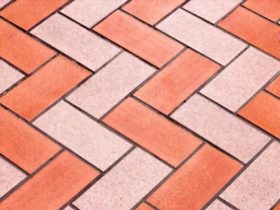What is a Quarry tile?
Quarry tiles is an acrylic tile used for commercial uses such as commercial kitchens and food preparation rooms. Quarry tiles is a tough, impervious paving tile created from ground minerals molded and burned in the same way bricks are.
Because of the minerals utilized and the extreme firing temperatures are often tougher than conventional clay bricks. This is an excellent choice for commercial areas because of its longevity, barrier properties, water holding capacity, color possibilities, and temperature resistance.
They’re commonly found in older homes and have a timeless appeal. They were initially produced by hand, had beautiful flaws, and appeared in various environmental earth colors ranging from red to blue-black, with subtle variances in tone and texture.
To generate diverse hues, several manufacturers today utilize a variety of stains and artificial pigments. This tile is water-resistant since it is not permeable and low absorption rate.
Unlike ceramic and porcelain tiles, Quarry tiles do not have a superficial enamel layer. They have a little rough feel best suited for high-moisture situations and provide good traction for outdoor use. They’re suitable for some walls and worktops.
Sealing
Quarry tiles are laid the same way as ordinary tiles and do not require extra techniques. Whether installing the tiles on the wall or the floor, you’ll want to use a thin-set tiling adhesive. You do not need to seal quarry tiles because they are compact and have a slow absorbency. So, typical wear does not necessitate sealing for this type of tile, but unusual wear, such as heavy traffic, oil, and greasy, may require sealing. If this is the case, a water-based piercing sealer should be used.
Red quarry tile
Quarry tiles are natural goods that come in a limited range of earth tones, including dark gray, light gray, tan, brown, and beige. However, red quarry tile is now the most common color as red is the color of the raw clays that many quarry tiles are made of.
Red tiles are a popular choice since they are the best color for disguising stains. If you want a natural aesthetic, we propose red quarry tile. Red quarry tile may be used on both walls and floors, and it’s perfect for creating a striking statement floor near fireplaces, as skirting, and as a border.
Wet room tiling
Tiles are a standard pick for wet room flooring because of the beautiful polish they provide. Tiles come in various styles, materials, and textures, and they can serve to improve the appearance and comfort of a wet room.
They are not easy to maintain, but they’re also fitted on any floor. Quarry tile is almost impervious to water, making it ideal for usage in wet regions or outdoors.
Tiles are a trustworthy floor material to deal with in wet room installation and maintenance. They function well with the current draining and waterproof solutions available, but they can also be installed on solid or wood floors.
How to clean quarry tiles
The aim is to use your spray bottle to administer the detergent, then stir it with the brushes and scrubby brush after the needed soak time. It is critical not to allow the floor to dry because the goal is to remove unclean fluids from the tiles.
You spray detergent and wait for it to work, then reapply extra detergent or water if it starts to dry out. You’ll need an excellent wet sludge to scrub and lift some dirt and debris with your cloth or sponge.
The brush’s motion drives the detergent into the small crevices, effectively breaking away the wax and oil accumulation that even most classic Quarry and Terracotta tiles contain.
It’s also an excellent time to use your agitating brush to remove the rough edges at this point. Then, with a clean pail of water, remove the nasty sludge and other debris.
Alkaline tile cleaners
The pH of alkaline cleaners is 12, making them extremely caustic. Use this cleanser to get rid of tough grease or other things that won’t come off with just water. The first step is to remove and dissolve wax, grease, paint, and other substances with a powerful alkaline cleaner. While alkaline cleansers will not affect tile or grout if used regularly, they can remove grout sealant over time. You can find these alkaline cleaners at most stores.
Acid tile cleaners
Quarry tiles are acid resistant, and the acid cleans the surface thoroughly. A powerful combination of acids and surface-acting compounds can be used daily for deep cleaning. Because acidic cleansers float out many other types of dirt that alkaline cleaners don’t, it’s critical to use the alkaline cleaners first. Otherwise, your acid won’t be able to clean the entire tile.
Quarry tile maintenance
Quarry tile is a desirable flooring suitable for large areas such as kitchens because of its water resistance and longevity. They will, however, get soiled, just like any other flooring. By following basic quarry tile care, you can considerably extend the life of your quarry tile flooring.
- Consider using an enzyme-based, antibacterial cleaning mix, as these chemicals cut grease and remove odors.
- You can use any vacuum cleaner to clean your quarry tile. When using a vacuum with a beater bar, be careful not to drag grit over the tiles since this will harm the sealer or wax.
- Wipe all traces of moisture from the tile’s surface using a clean, dry absorbent towel.
- Make sure all corners and door jams are clean.
- We recommend using a stitched-end (tailband) microfiber or a looped-end mop for the best results.
- Quarry tile is unglazed, and it should be sealed on a regular basis to prevent staining and discoloration.











Leave a Reply